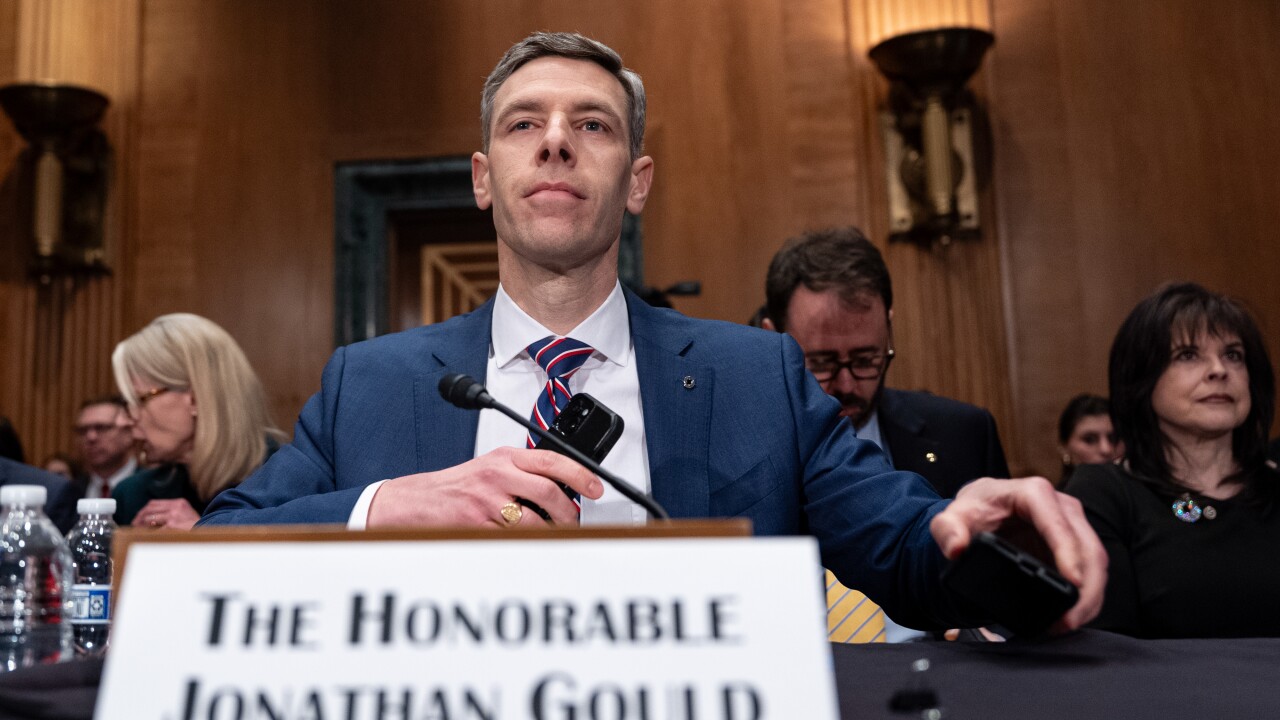WASHINGTON - A year after enactment, the Gramm-Leach-Bliley Act has hardly transformed the financial services landscape.
Rather than unleashing a wave of mergers among banks, brokers, and insurers, the law has flooded the industry with new regulations, including customer data protections.  "We thought we'd be doing a lot of cross-industry mergers," said Ronald R. Glancz, a partner in the Venable law firm here. "Instead, we're writing a lot of privacy notices."
"We thought we'd be doing a lot of cross-industry mergers," said Ronald R. Glancz, a partner in the Venable law firm here. "Instead, we're writing a lot of privacy notices."
But Gramm-Leach-Bliley has helped several companies accomplish specific goals, and it has simplified operations for a host of firms, particularly foreign banks. Loopholes are no longer needed by banks that want to sell insurance or underwrite securities.
To date, the law has made big winners of three companies:
- Citigroup Inc.'s bold move to combine an insurance underwriter with a commercial bank and a securities firm was authorized.
- Charles Schwab Corp., the king of discount brokerage, moved up-market by acquiring U.S. Trust Corp.
- MetLife, the giant insurer with big plans to become a force in retail banking, unveiled its first step with a deal for Grand Bank in Kingston, N.J.
Without a doubt, Citigroup benefited the most under this law, at least in the short term.The company was born in 1998 of a merger between Travelers Group and Citicorp - a deal most people figured was illegal under then-current law barring banking companies from underwriting insurance. But the Federal Reserve Board approved the deal, and gave the combined company two years to divest Travelers' underwriting business.
Citigroup took a gamble that it could change federal law before the two years expired. It took 18 months.
Gramm-Leach-Bliley created something called a "financial holding company" and gave these entities the authority to do banking, insurance, and securities business. Voila! Citigroup was legal, and no assets had to be sold.
Charles Schwab's $2.9 billion deal for U.S. Trust, announced in January, was the first blockbuster, and it raised expectations that a slew of cross-industry mergers was on the way. It married Schwab's successful discount brokerage business with U.S. Trust's superwealthy client base and widened its product offerings to include such services as tax and estate planning.
MetLife's pending deal may look small, but the insurer plans to use its $80 million-asset bank as a platform to offer retail banking and asset management products to its 11 million policyholders nationwide. MetLife hopes its bank, to be renamed MetLife Bank, can capture the $17 billion it forks over each year in death benefits and other insurance payments. MetLife Bank is to offer checking and savings accounts and investment products such as mutual funds. The deal is slated to close this year.
BEHIND THE HEADLINES
A few other nonbanks are in the process of taking the plunge and buying banks.
Investment banking boutique Friedman Billings Ramsey Group Inc. of Arlington, Va., has an application pending to buy a small bank and asset management firm in Bethesda, Md.
"The one piece that was missing to make us a well rounded institution was to have commercial banking powers and fiduciary powers," said Webb Hayes, managing director of the private-client group at Friedman Billings.
Ullico Inc., an insurance company in Washington, D.C., is working on a deal to buy $600 million-asset Amalgamated Bank of Chicago. The goal is a nationwide branch network offering banking, insurance, and investment services to unions and their members.
And finally, five community banks in Indiana and Ohio recently joined forces to buy a 50% stake in a property and casualty underwriter, Century Surety Group. Jeffrey A. Maffett, president and CEO of the $169 million-asset Eaton National Bank and Trust in Ohio, said the bankers want to design and manufacture - not just sell - insurance products.
To date, 435 financial holding companies have been formed. The vast majority were started by banking companies - 80% of which have less than $1 billion of assets.
But many people think a rush is still coming; they note the pickup in merger activity of recent months - particularly involving foreign banks. Roughly 20 foreign banking companies have opted to become financial holding companies.
HUNGRY FOR BROKERS
Many of the deals by foreign banks could have been executed before Gramm-Leach-Bliley, but the law made doing the deals cheaper and faster.
Gone is the time-consuming and expensive application process at the Fed. Gone is the requirement that securities underwriting be done in a special subsidiary with revenue limits. Gone is the rule requiring that insurance operations be based in a town with fewer than 5,000 people. Gone is the mandate that "nonpermissible" activities such as merchant banking investments be divested.
"The law makes the system more transparent," said Bill Sweet, a partner at Skadden Arps here who has foreign bank clients. "It makes it a lot easier for people in Europe or elsewhere to do deals here."
Just look at all the foreign bank deals of late: Credit Suisse Group's $11.5 billion deal for Donaldson, Lufkin & Jenrette Inc. and UBS AG's $12.4 billion deal for Paine Webber Group Inc. both closed last week. In September Dresdner Bank AG in Frankfurt announced plans to buy Wasserstein Perella Inc., and Royal Bank of Canada unveiled its deal for Minneapolis-based Dain Rauscher Inc.
"It is irrefutable that for companies that become financial holding companies, this has created a smoother highway," said Larry Uhlick, executive director of the Institute of International Bankers. "Once you become a financial holding company, you don't have to complete complicated applications - that's a big plus for everyone."
Mr. Uhlick did say that it can be tougher for a foreign banking concern to prove it is well managed and well capitalized - two hurdles to becoming a financial holding company.
"Despite flexibility shown by the Federal Reserve," he said, "there are only 20 internationally headquartered banking organizations that have received financial holding company status because of the considerable uncertainty and concern regarding the application of the 'well capitalized' and 'well managed' standards to institutions."
LOOPHOLES WERE EXPENSIVE
Beyond making mergers simpler, the law allows banks to save buckets of money now that they do not have to use loopholes to underwrite securities, sell insurance, or distribute mutual funds.
"It has removed a lot of the inefficiencies that were placed on the industry's operations," said Richard M. Whiting, executive director of the Financial Services Roundtable. "For instance, in the insurance area financial conglomerates no longer have to go through that place-of-5,000 nonsense and in the securities business, they don't have to blow up the balance sheet to fit underwriting revenues under the 25% cap."
Most banks with section 20 securities subsidiaries have converted them to financial holding company units. Many banks have moved insurance sales operations from small towns to their headquarters cities.
Cullen/Frost Bankers Inc. of San Antonio has done both.
Dick Evans, chairman and chief executive officer of the $7.4 billion-asset banking company, said it became a financial holding company, converted its section 20 securities unit, and moved its insurance operation out of a small town. "In order for us to compete with large megabanks on a statewide basis, we believe that we should also have the ability to offer a wide range of financial services," he said. "The law made it more efficient for us to do that."
"Loopholes cost money," a federal regulator said. "A top bank told me it was a major boost to their bottom line."
NEW BUSINESS
What's more, Gramm-Leach-Bliley includes a laundry list of activities that no longer require advance approval, including services such as general management consulting; travel agenting; and the right to organize, sponsor, and manage a mutual fund. Financial holding companies simply give the Fed notice 30 days after starting something new, which speeds entry into lines of business and does not tip off competitors as the old applications did.
To let the law evolve in tandem with the market, federal regulators have wide latitude to expand the list. All they must do is determine that the product or service is consistent with Gramm-Leach-Bliley's intent and necessary to keep pace with changes - even expected changes - in the market or to let banks compete with other providers.
But beyond the law's business implications, Bert Ely, an industry consultant in Alexandria, Va., summed up what else passage of this law has accomplished. "It put an end to 20 years of battling over who could do what."
Wednesday: Factors affecting the success - or failure - of the financial holding company model.





